BBC Tells About Second Day Of ‘Hit Squad’ Member Harauski’s Trial
27- 21.09.2023, 14:49
- 25,912

Lukashenka has compared Belarus with Switzerland many times.
The trial of former “death squadron” member Yury Harauski took place in Switzerland. He gave official testimony for the first time in the “death squad” case concerning the disappearance in 1999 of two well-known Belarusian oppositionists Viktar Hanchar and Yury Zakharanka and businessman Anatol Krasouski. Harauski confirmed that security officials were behind their abductions and murders. He himself insisted that he was only detaining, not killing, the BBC reports.
The courtroom looks like a school auditorium. The amphitheater is occupied by journalists and human rights activists from Belarus, Russia, Switzerland and other European countries. At a long semicircular table on a dais are the chief judge and two jurors. They participated in the trial because cases of enforced disappearance had never been considered in court in Swiss history. And the court, as the lawyers explained, needed the jury so that ordinary citizens would understand its decision.
The defendant is in the center in front of the judge, at a smaller table. To his right is the translator. The artists are sitting in the front row — filming is prohibited in Swiss courts. One of them is making a sketch of the meeting with reportage precision. With one small extra detail — behind the backs of the judges, his painting depicts the face of Aliaksandr Lukashenka.
Lukashenka likes to compare Belarus with Switzerland. And it was in a Swiss court that the case of the disappearance of his famous political opponents in 1999 was first considered. In Belarus, the investigation into the abduction of politicians Viktar Hanchar, Yury Zakharanka, as well as businessman Anatol Krasouski began, was suspended, resumed, but did not produce any results.
Yury Harauski, who fled Belarus in 2019, spoke in an interview with DW (the publication is recognized as a “foreign agent” in Russia) about his involvement in the murders of the oppositionists. According to his story, they were killed by SOBR commander Dzmitry Paulichenka. Harauski, on the orders of his commander, participated in the detention of all three men. It looked much more like an abduction, and that is how the court now views it.
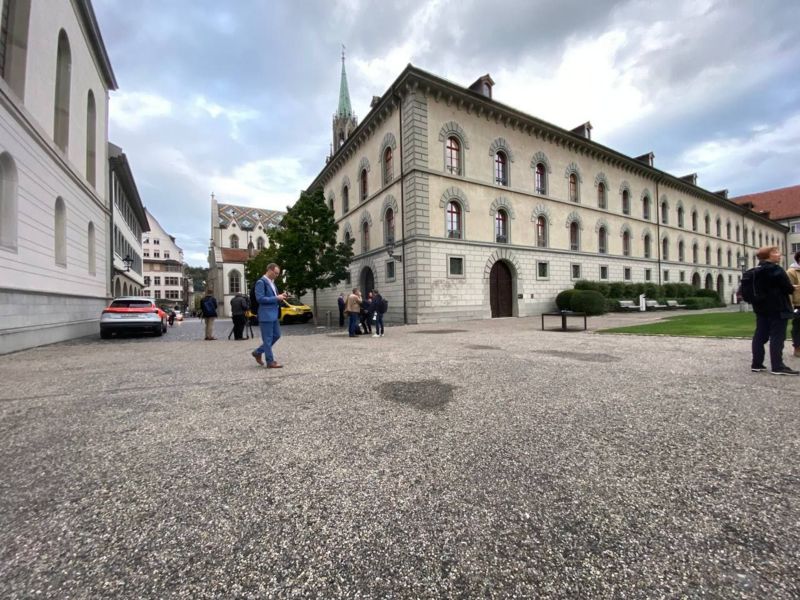
In 2021, Belarusian human rights activists from the Viasna center, together with European colleagues from the organizations FIDH and Trial International, achieved the initiation of a case against the former fighter — precisely based on his interview. They succeeded with the help of the principle of universal jurisdiction. It allows those responsible for serious atrocities such as genocide and war crimes to be tried, regardless of where the crimes were committed. The main thing is that the accused is in the country where he will be tried.
One of the most famous trials conducted on an extraterritorial basis is the trial of the “architect of the Holocaust” Adolf Eichmann in Jerusalem in 1961. True, he was kidnapped by Israeli secret services, but Harauski came voluntarily.
Enforced disappearance falls under crimes subject to universal jurisdiction, and the case against Harauski was opened under this article. The plaintiffs were the daughters of missing oppositionists: Alena Zakharanka and Valeryja Krasouskaya. Hanchar's family is still in Belarus and therefore did not participate in the case.
We will explain what happened, why it is important and what will happen next — quickly, simply and clearly.
45-year-old Yury Harauski is a large man, two meters tall. He was brought to the building under guard in a special minibus. At the same time, the defendant was at large throughout the two years of the investigation, thanks to his willingness to cooperate with the investigation and the court.
The former fighter, who had previously spoken to the media more than once about his activities in the SOBR and about his own life, now did not answer a single question from journalists. Moreover, during many hours of interrogation in court, he actually argued his own interviews — and even got angry.
On the first day of the hearing, Harauski sat at the table in front of the judges, head down. In response to questions from Judge Olav Humbel, he muttered quietly or gesticulated — nodded, shook his head, shrugged his shoulders. The judge asked him to speak up several times. He began the interrogation by telling Harauski about his right to refuse to testify. He replied: “I want to exercise my right not to answer a series of questions.”
Then the judge asked about the defendant’s well-being (“everything is fine”), about his social status (“not married, have a daughter, I work, but I don’t want to specify where”), about his youth in Belarus (“an ordinary working-class family,” “went to school, college, institute”, “trained as an auto mechanic”) and about other relatives (“father died, mother is alive, I have a brother, eight years apart, two nephews, they live in Belarus”). Harauski did not answer questions about the murder of Yury Zakharanka in as much detail as in the interview in 2019.
Yury Zakharanka was the first Minister of Internal Affairs of independent Belarus, he resigned and joined the opposition. In 1999, he tried to create an organization of security officials dissatisfied with Lukashenka’s activities.
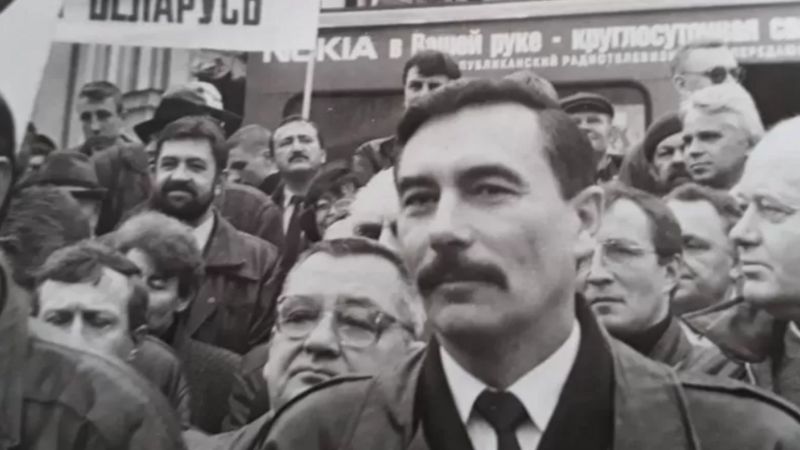
“Paulichenka developed a plan. We arrived at the address,” this is how Harauski describes how they waited for Zakharanka near the parking lot. “We were waiting for him to park the car and go home.” He got out of the car and we detained him.
“What car did you put him in?”
“I don't remember. Dark in color,” in an interview, Harauski described the events more precisely: that SOBR soldiers arrived in two cars to detain Zakharanka: a red BMW 525 and an Opel Omega.
“So you put the man in the car, took him to the outskirts — what happened next?” the judge continued.
“Paulichenka said to take [Zakharanka] out of the car and put him on the ground. Paulichenka took a pistol out of the glove compartment and fired twice. Then Paulichenka bent down and checked if the victim had a pulse, and said to put him in the trunk.”
In an interview in 2019, Harauski said that it was not the commander who checked the pulse, but another fighter, Siarhei Shkindzerau. He also claimed that Paulichenka gave him a special silent pistol, and he handed it back to the commander when Zakharanka was brought to the alleged murder site — the internal troops training base in Valoushchyna. This pistol is used by special services, and it is also used in the execution of the death penalty in Belarus.
Harauski said in court: he did not think that the former head of the Ministry of Internal Affairs would be killed. And this is another contradiction from his 2019 interview. Then he said that everyone understood everything at once: both the fighters and Zakharanka himself, who allegedly asked them “to make sure it doesn’t hurt.”
At the court hearing, Harauski added that, having seen the reprisal against Zakharanka, he began to think about leaving the country.
“Did you know who Zakharanka was?” the judge asked.
“I served in the internal troops, it is logical that I knew who the minister of internal affairs was.”
The former fighter continued to insist that when Zakharanka was detained, he was sure that the oppositionist “would just be taken somewhere outside the city and they would simply talk to him.” Maximum: “detained and imprisoned.”
“At the beginning of this operation, wasn’t it clear to you that he would be killed? When did you realize that?” the judge asked.
“When Paulichenka shot.”
“I realized that they would be killed”
Viktar Hanchar started in Lukashenka’s team in the early 1990s, was a deputy of the Supreme Council, and headed the Central Election Commission of Belarus. Then he went into opposition and in 1999 tried to organize alternative presidential elections — based on the idea that Lukashenka was going to hold the official ones illegally.
On September 16, 1999, Hanchar was in the bathhouse with his friend, businessman Anatol Krasouski.
“In the morning [of that day], Paulichenka gathered those who participated in the detention of Zakharanka and said that today we would go to detain one or two people,” Harauski began. “We arrived at the address. We were sitting in two cars.”
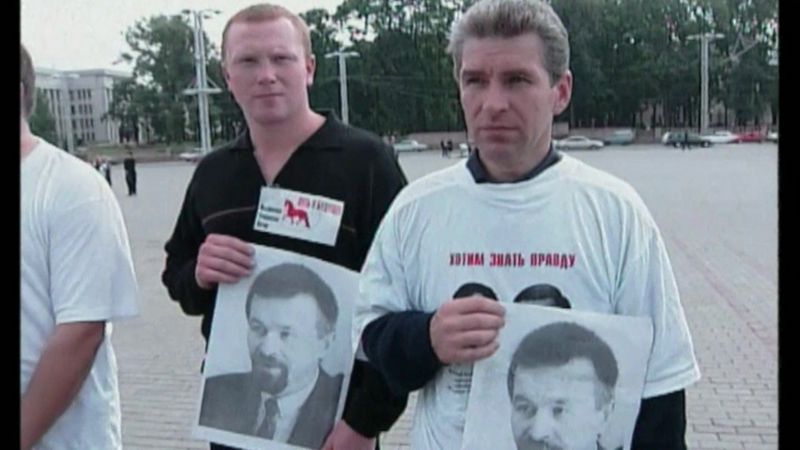
The fighters drew up a “verbal plan” and waited for the jeep of entrepreneur Anatol Krasouski — he was driving Hanchar. The latter was detained by Harauski. According to him, he broke the car window with a special chain and pulled the politician out of the car with a fighter named Pankou.
“When breaking the glass, I already realized the gravity of the crime, and when detaining Hanchar, I deliberately broke the bridge of his nose so that blood would flow,” said Harauski. He did this, allegedly to leave traces at the scene of the abduction.
In an interview with DW in 2019, he did not mention this plan, but based on traces of blood and broken glass, investigators actually determined the place from where Hanchar and Krasouski were taken — the area near the bathhouse on Fabriyhnaya Street in Minsk.
After the detention, the politician and businessman were taken towards the village of Biahoml in the Vitsebsk region. At the exit from Minsk, according to Harauski, they stopped, a certain man looked into the car, demanded to show him Hanchar, looked at the politician and said: “It’s him.” The defendant does not know who it was.
Then both oppositionists were brought to a mothballed military base. The ex-fighter no longer denied that the fate of both men was clear to him: “After we detained them and drove to Biahoml, I realized that they would be killed.”
The abducted people were “put on the ground side by side” on Paulichenka’s orders. “After that, he came up and shot both of them in the back, in the area of the heart, two shots,” said Harauski. After five to ten minutes, according to him, the commander ordered the soldiers to undress the dead and bury them in an already prepared pit. All of Hanchar and Krasouski’s belongings were burned, except for shoes “because they take a long time to burn.”
“They presented me as a killer [in a 2019 interview]. I didn't kill anyone, I just detained people. I want to convey to everyone that there is now a dictatorship in Belarus. They kill people with impunity,” Harauski insisted.
The prosecutor asked why the defendant was changing his testimony — this could cast a shadow on the veracity of his story. Harauski got angry again and demanded that “the questions be formulated correctly.”
“It's too difficult to explain”
The court in the canton of St. Gallen set several precedents. Prosecutor Peter Hangartner went to court for the first time in the country's history with a case of enforced disappearance, and Swiss judge Olav Humbel considered such a case for the first time.
For the first time, human rights activists achieved a real trial in the case of abductions of oppositionists in Belarus. Plaintiffs' lawyer Severin Waltz, who has spent his entire career representing victims in criminal trials, was handling a political assassination case in Belarus for the first time. The families of Zakharanka, Krasouski and Hanchar finally saw a man tried for the massacre of their relatives — even if not in the court of his native country. The daughters of Zakharanka and Krasouski sat in the front row, behind Harauski. During the entire process, he never turned to them, even when he apologized.
Judge Olav Humbel made a (futile) attempt to understand the structure of the Belarusian armed forces. From 1996 to 1998, Harauski served as a conscript in military unit 3214 of the Internal Troops of the Ministry of Internal Affairs in Minsk. The Swiss judge did not understand why an army unit was performing police functions. “We ask because we do not have such units belonging to the Ministry of Internal Affairs,” he explained. “And what are you doing there?”
“We’re training,” Harauski answered briefly.
“Pilots train to fly, infantry train to shoot, what did you train for?” the judge began to get irritated.
Harauski refused to answer because “it’s too difficult to explain.”
Olav Humbel also tried to figure out the role of Dzmitry Paulichenka, the ex-commander of the special forces brigade of the internal troops of the Ministry of Internal Affairs. Paulichenka’s possible involvement in the murders of oppositionists first became known in the 2000s from reports by high-ranking security officials: they showed that he took a pistol to carry out death sentences on the days of the disappearance of oppositionists.
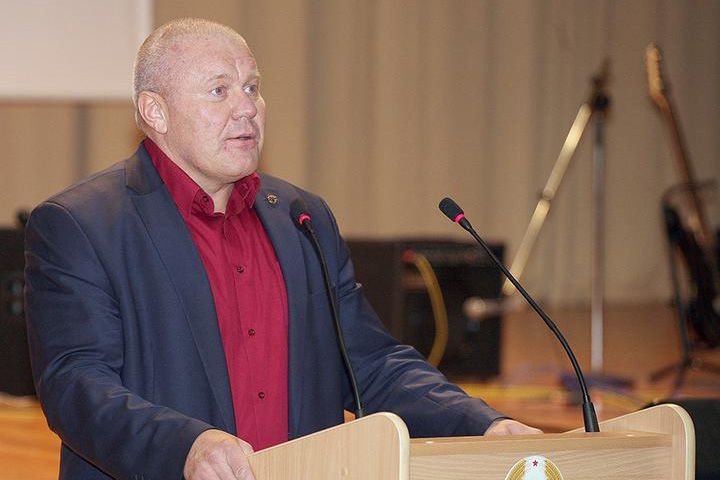
Then Paulichenka was detained and released a few days later.
In 2004, PACE special rapporteur Christos Pourgourides, who investigated the disappearances, came to the conclusion that Zakharanka, Hanchar and Krasouski were kidnapped by a special squad of security forces under the command of Paulichenka, and all this happened with the knowledge of the country’s leadership. The report did not contribute in any way to solving these crimes in Belarus itself. Paulichenka, along with former ministers Navumau and Sivakou, were included in sanctions lists in Europe.
Paulichenka has been retired for a long time, he continues to live in Belarus. During the 2020 protests, he was seen commanding a riot police unit to disperse demonstrators.
On September 14, 2023, he appeared in the propaganda program “Speak, Don’t Be Silent” on the Belarus-1 TV channel. There he argued that the strongest opposition politician in Belarus was the leader of the Popular Front, Zianon Pazniak, who emigrated from the country in 1996.
“A 20-year-old soldier, a small gear”
The prosecutor considered that although Harauski changed some of his testimony, his guilt was still confirmed. He requested a relatively small punishment — three years in prison, of which one in prison and two suspended with a probationary period of four years.
At the hearing, lawyer Severin Waltz spoke about the suffering their disappearance brought to the relatives of Lukashenka’s opponents. “This is an ongoing crime, and you live with this uncertainty for many years, and, according to Swiss law, this pain allows you to claim compensation,” he explained. The lawyer asked for 200 thousand francs (208.4 thousand euros) for the victims, emphasizing that this amount would never cover all their suffering.
In a conversation with the BBC, Walz admitted that he does not know what payment they will ultimately be awarded and doubts that it will be large — Harauski will have to pay it.
It is important for the former SOBR member to receive a guilty verdict in the case — it will allow him to obtain refugee status, which he still does not have. “The court focused on whether he could be trusted when examining his asylum claim. And it was a truthful confession,” Waltz said. The fact that Harauski changed his testimony in court, according to the lawyer, clearly shows that he well understood the gravity of his actions.
Harauski's lawyer, Vi Huyen, insisted that her client had no intention of carrying out the “enforced disappearance” of opposition politicians. She declined to comment to reporters until the court's decision.
At a meeting on Tuesday, Harauski chaotically apologized to the relatives of the oppositionists killed with his participation. He read from the piece of paper that he deeply regretted and asked for forgiveness, and in those days he was “a 20-year-old soldier, a small gear carrying out commands”.
Harauski’s last word was also short: “Dear court, you will now make a decision. [If] you make a harsh decision, I’m more than sure that no one else in the world will report crimes committed by the authorities.”
Alena Zakharanka, the daughter of the first Minister of the Ministry of Internal Affairs of Belarus, said that Harauski promised her “to go to the end and carry out his mission” in court in the case of the disappearance of her father. “Of course he kept his promise,” she said.
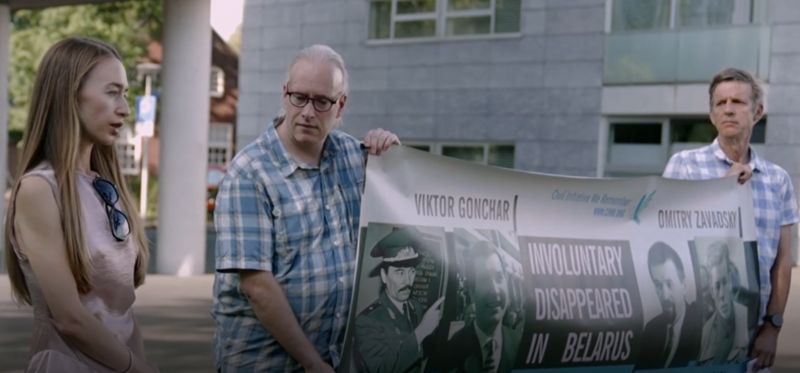
“He told what he considered necessary,” Valeryja Krasouskaya shared her impressions of the trial with the BBC. “Everyone got the impression that he wanted to downplay his role, maybe he still sees it as insignificant. It’s not for me to judge whose role is greater and whose is less.”
Both women believe the former fighter’s story, despite changes in his testimony. Now they are waiting for the court's decision. Judge Humbel announced that the verdict would not be announced orally. It will be sent to the parties by mail next week.










